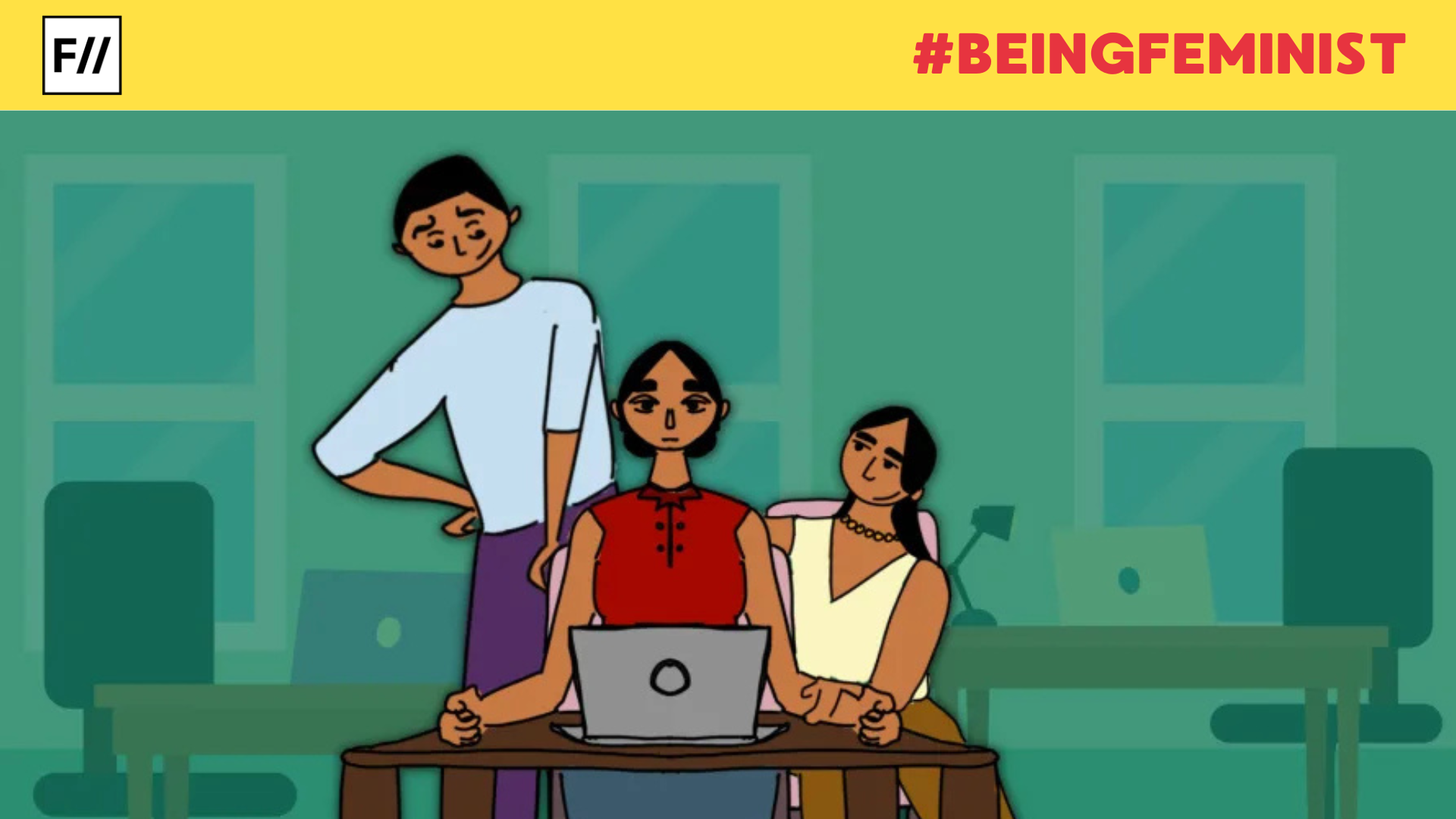There is a video going around showing a group of young women confronting an older woman for making remarks about one of them. Here’s what happened: in a restaurant in New Delhi yesterday, a group of young women crossed paths with an older woman. She felt that one of the young women was wearing a dress or skirt that was too short, so she told her that she deserved to be raped for her attire. The group of young women followed her into another shop, demanding an apology and shaming her for her sexism, and they recorded the whole confrontation. Then they shared the video on social media to shame her, and the video has been going viral since.
People on social media have reacted with outrage, and in many cases people have themselves used sexist and classist taunts to insult her. The reaction of the audience on social media has come uncomfortably close to bullying, with people criticising and ridiculing the older woman because she is an easy target while ignoring the larger problem which she represents.
It is heartening to see many feminists and social media influencers urging restraint and balance in the expression of our anger and disgust towards the sexist woman in the video. They have been discouraging sexist attacks on her and have reminded their followers that we should not stoop to the level of the bully when reacting to the incident. Many have argued that this kind of confrontational meanness is not constructive, especially since the offending woman is herself a victim of internalised misogyny. The responsible, truly feminist thing to do in this a situation like this is to try and educate people like her – which will be impossible if we villainise and humiliate her online in this manner. However, this perspective misses a key element of the incident as it allegedly transpired.
In a patriarchal society like ours, the prevailing codes of conduct for women place the onus of their safety on them.
The woman in question told the girl that her outfit was revealing and then proceeded to say that she deserved to be raped for wearing revealing clothes. That’s one part of the story, the part which is so familiar to so many of us young women growing up in India. Older women, ranging from the ones we know well to complete strangers, all too often go out of their way to criticise us for our appearance, behaviour, and choices if they don’t adhere to their standards of propriety.
We have experienced slut shaming, gossip, moral policing, lectures, and sexist and misogynistic remarks from random older women (pejoratively called “aunties”), and we have fought back. Once our initial shock and outrage after this kind of encounter wear off, we need to remember that it is important to focus our energies on educating people rather than bullying them back. So yes, making a video go viral like this for the sole purpose of shaming yet another sexist aunty is definitely problematic and counterproductive.
Also read: On Aunty Shaming And Why It Matters To Feminism
But the thing is, this aunty didn’t stop at sharing her unasked-for regressive views with the women in question. She did a far more dangerous and aggressive thing: she apparently told the men in the restaurant that they should rape the women. This is how the young woman who posted the video to social media describes it: “(She) addressed seven men at the restaurant (sic) to rape us because she felt we deserved it for wearing short clothes.”
This part of the story changes things for me completely.
In a patriarchal society like ours, the prevailing codes of conduct for women place the onus of their safety on them. Women must prove that they are “good” women by acting, dressing, and speaking in a certain way. Female sexuality is policed and punished by older family members, authority figures, and institutions. Women are routinely told to cover up to avoid sexual assault; and if they choose not to, they are told the converse – that they wanted to be harassed and assaulted, which is why they chose to wear revealing clothing.
The power differential between older, often middle-aged women, and young women means that the former can police, control, and criticise the latter’s choices. This is what gives rise to the “aunty” phenomenon in India – older women with internalised misogyny who become foot-soldiers of the patriarchy, taking it upon themselves to both, teach younger women how to demonstrate that they are “good” women (by complying with the codes of the patriarchal culture), and punish the women who fail to do so.
When criticising and slut shaming the young woman in question didn’t work, she used her privilege and position to tell the men present there to sexually assault her in order to put her in her place.
The older woman in the video did exactly this. When criticising and slut-shaming the young woman in question didn’t work, she used her privilege and position to tell the men present there to sexually assault her in order to put her in her place. This is a cold-blooded act of aggression and violence. It is literally an act of using one’s patriarchal power to try and punish someone who doesn’t have that power, by encouraging the most patriarchal punishment possible for women: rape. It was a supremely hostile act and needs to be viewed as such.
Rape has long been used as a means of subjugation, control, and spreading terror. When we learn about armies and soldiers using it as a tool during times of war and conquest, we are heartbroken. When our politicians and leaders advocate rape as a means of punishing or threatening women and the communities they belong to, we are aghast. Threatening someone with sexual violence in our times is unacceptable; instructing others to sexually assault someone just to prove your point is inhumane.
Can you imagine stepping out of the house in what you think is an ordinary outfit, only to run into a woman who is so offended by it that she tells the men around you to rape you? Can you imagine lunch with friends turning into a battleground where you are publicly shamed for your clothing and find yourself having to defend yourself? Can you imagine having to be in a space which felt safe and comfortable, only to be turned into a situation where someone is advocating violence against you simply because they can? How would you feel? How unsafe, vulnerable, and scared would you be? All your power is taken away from you, someone openly advocating harm to you? Being forced to wonder if the men in that space would ignore her or decide to also get involved and punish you in whichever way they felt fit?
Also read: How I Learnt To Unlearn My Internalised Misogyny
The older woman, by telling men to rape the young woman, was using a very old, chilling patriarchal tool: rape as punishment. She took away the power of the young woman and her friends in that interaction. Whatever the group of young women did after that- following her into another shop, confronting her, demanding an apology, even taunting her, and finally shaming her on social media her – was all in an effort to take that power back.
Tanvi Khemani is a writer and filmmaker based in Mumbai. She works on her independent documentary film during the day and reads everything she can get her hands on at night. You can follow her on Instagram.
Featured Image Source: NDTV




